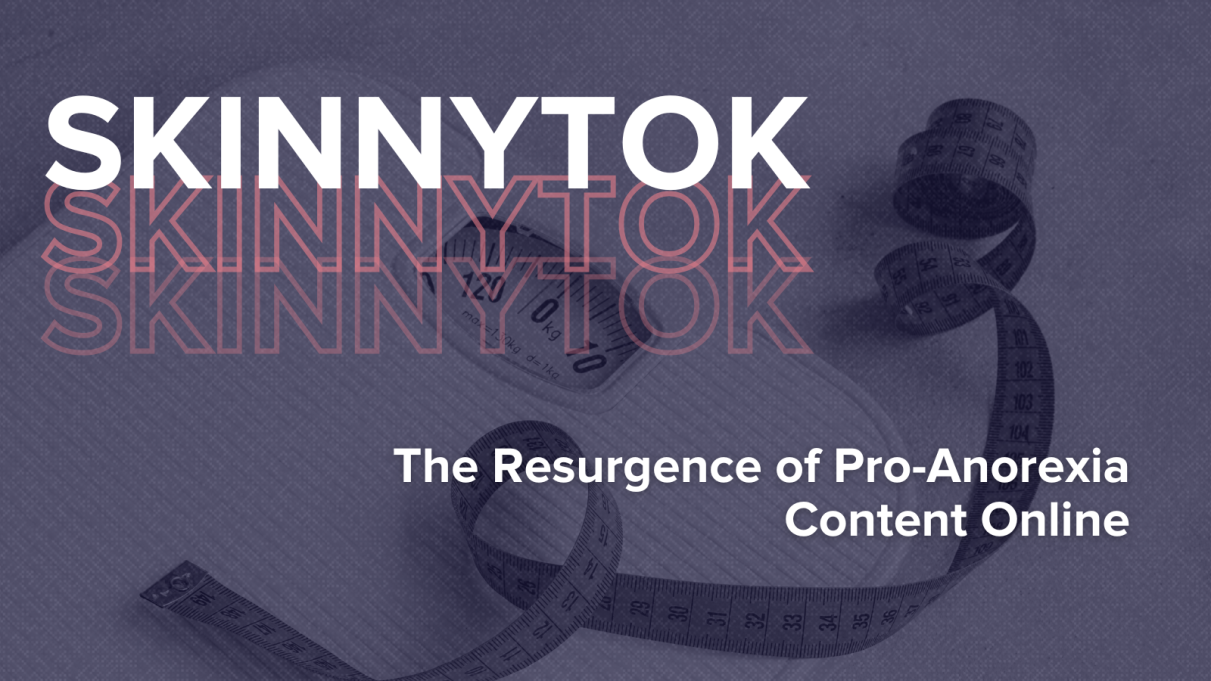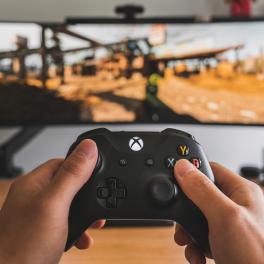
Please note: this piece includes sensitive topics that some people might find difficult. Please visit our Resources Page for help.
The 2010s saw the strong rise of body positivity for women and girls. We had activists pushing for size inclusivity and brands that listened, with plus-sized fashion models covering Vogue and Vanity Fair.
Reasons behind the movement’s rapid growth in the 2010s are varied; perhaps it was a rebellion against the thin-focused ‘heroin chic’ look that dominated women’s fashion in the 90s and 2000s. Either way, the body-positivity movement seems to have now faltered, with the rise of so-called fitfluencers taking centre stage. A push for health and fitness is great, but with many experiencing the increasing force of pro-anorexic content and toxic wellness, we may have forgotten some of the lessons of body positivity. In this youth review, we explore the latest rise of eating disorder content and its impact on young people.
Understanding Anorexia
Anorexia nervosa is a mental illness categorised by an uncontrollable urge to starve the body as a form of control. Patients have an obsessive relationship with food, with symptoms that include hoarding, compulsive arranging, memorising nutritional values and ingredients, as well as coercing others into over-eating.
The disease creates intense feelings of disgust, hatred and ‘fatness’ after consuming food. Some patients hallucinate fat ‘growing’ on their bodies, while others fear touching or handling food, at risk of it penetrating the skin and causing weight gain.
“I refused to cook or touch food unless I was wearing gloves. I was so scared of it sinking in and making me fat” – VoiceBox community member
Patients may also become obsessed with exercise, count visible bones under the skin and monitor their weight excessively. People with anorexia are often solitary, going to extremes to hide the disease from family and friends by wearing baggy clothes, chewing and spitting, hiding food, and drinking dangerous levels of water to give the illusion of weight gain.
‘Rowen’, a young person who developed an eating disorder in the 2010s, remarks on their experience: “Developing an eating disorder stems from control, but my mind was out of it. I was completely gone. It’s hard to explain, but I can only describe it as a monster that controls your actions and changes your personality. I barely remember anything from when I was sick.”
The raw, chaotic 2000s internet gave rise to ‘pro-ana’ forums and Tumblr blogs, designed for exchanging tips on starvation, avoiding treatment and low-calorie foods.
While there were elements of support to these, one VoiceBox member told us they were often a breeding ground of competition to become the sickest.
Rowen agrees: “I started having disordered thoughts years before developing my fully-fledged eating disorder. When it took over, it was 2014, and Tumblr was in its prime. Thinspo content seemed to be everywhere, and there was a particular emphasis on thigh gaps. But even over the years before, very thin bodies were at the forefront of the celebrity landscape, and I’d been unhappy with my body for as long as I can remember.
“I do think using social media as a teenager was influential to the development of my eating disorder.”
Eating disorder content is categorised as legal but harmful under the new Online Safety Act, and websites are required to prevent children from accessing it. Tumblr, despite all its toxicity, was ahead of the curve and banned eating disorder blogs in 2012 (although, as Rowen tells us, this wasn’t completely successful). Fast-forward to today, and eating disorder content still very much exists. ‘SkinnyTok’ is a community of TikTok creators who idolise thinness to an extreme (and dangerous) level, often hidden behind a facade of wellness and clean eating.
Although the term was coined on TikTok, pro-anorexia and toxic wellness content are widespread and not limited to any one platform; these trends can be found across a range of social media, especially as influencers and creators regularly share and repost their material on multiple apps.
“You Need A Treat? What Are You, A Dog?”
A quick search on social media platforms brings up countless videos aggressively promoting an extreme skinny lifestyle. Many of the creators are women, who share ‘motivational’ monologues, body checks, dangerous calorie deficits and diet tips.
“Your stomach enters the room before you do. Get up and walk, tubby” – TikTok creator
“The internet bullied me into fitness again.. so i’m doing the same for you” - TikTok creator
In one TikTok titled ‘This Month’s Diet Is Next Month’s Body’, the creator eats a stuffed pepper with tomatoes for dinner. She tells her audience, “If you want to be small, eat small.” Another TikToker asks her followers to share “toxic motivation and tips to lose weight”. “The skinnier, the happier”, says one comment, while another writes, “food is an addiction and your hunger is the withdrawal symptom.”
Other creators take their videos from ‘wellness’ and ‘clean eating’ to in-your-face extremes, with body checks showing off underweight physiques. While some users express concern in the comments, most of them are full of admiration, writing “dream body” and “drop your diet” in response.
Similarly, the now-removed TikTok ‘chubby filter’, which used AI to make people look overweight, went viral after groups of women used it to show off their thinness.

Social media platforms have, in part, tried to tackle the issue, such as TikTok creating a pop-up directing users to support. Their Community Guidelines state that disordered eating and body image content is restricted to over 18s, and at the beginning of June (2025), the company blocked hashtags including #SkinnyTok and #BodyCheck. Instagram has implemented similar measures: restricting or blocking searches for certain eating disorder-related hashtags and, as of early 2024, automatically placing teens on the most restrictive settings to limit exposure to harmful content about eating disorders and body image.
While we think this is a great step forward, loopholes persist – users can sidestep restrictions with alternative spellings or by having an account that misrepresents their age.
The implications of this worsen when you consider social media’s ability to reach unfamiliar audiences who otherwise wouldn’t seek out SkinnyTok-related content.
“Of course, in the 2010s, there were celebrities who promoted disordered eating, but TikTok is more personable”, reflects Rowen. “Many lifestyle influencers and creators also appear to be participating in body checking on camera, which can only contribute to pro-ana narratives."
“Like 15 years ago, pro-ana blogs were often anonymous; there would be a few people sharing weight updates and stuff, but if you wanted to hide behind a screen, you could do that. I think it’s changed now.”
While SkinnyTok content is mostly made by, and targeted at women, other 'tough love' content is consumed by men, particularly within the 'looksmaxxing' and fitness communities, who promote extreme physical ideals.
Liv Schmitt And The ‘Skinni Société’

"Skinni is a mindset.
This isn’t restriction. This is taste.
Not Disordered. Just Disciplined.”
– Liv Schmit
Sadly, eating disorder content is infecting all corners of the internet. Liv Schmitt is a content creator who, despite being banned from TikTok for violating community guidelines, has continued to grow in popularity.
Her subscription-based ‘Skinni Société’ community – starting at $20 a month and housed on Instagram – gives people access to a closed group chat where Schmitt shares weight-loss tips and ‘skinny motivation’. According to an investigation by The Cut, children were among the Skinny Société community, despite a so-called 18+ restriction. Former members, who called the group chat ‘obsessive’ and ‘competitive’, said some women shared dangerous side effects like hair loss and dizziness.
“You’re not restricting. You’re 'regulating.' It’s chic.” – Liv Schmit
Meta has since demonetised her Instagram account, but Schmit fired back by sharing support messages from her fans to her Instagram Story.
“I’ve literally never been the same since. You made me get my skinny body!” – Skinni Société member
“They can’t stand empowered women, it’s so unfair and twisted!” – Skinni Société member
The Skinni Société has echoes of pro-ana forums. It may be dressed up in pink sparkles, but underneath is a spiral into unhealthy attitudes and diets. Rowen, who knows all too well the dangers of pro-ana, feels Schmit is using the Skinni Société to fuel her eating disorder: “Let’s not forget that eating disorders often cause a superiority complex. You want to be the thinnest, and you want people to validate you. I can see Schmit using the Skinny Société to play god. She's the final boss of anorexia, and that can only be making her illness worse.”
“People idolised her. They would kind of beat themselves up over their food diaries because they wanted theirs to look just like hers, and maybe they had, like, nine extra calories that day.” – The Cut interviewee
“This gives me horrible flashbacks to all the pro-ana content that was on Tumblr when I was growing up, and that s*** really ruined my relationship with my body and with food. It definitely sounds like she's preying on impressionable young women who want to look like a model, and they think it'll happen if they follow her advice.” – Reddit user
What Needs To Change?
While we welcome platforms acknowledging the increase in eating disorder content and their efforts to signpost support, this isn’t tackling the root cause.
Disordered eating has existed long before social media, and will likely outlive it, but platforms could take proactive steps to curb the harm and move quickly when users flag eating disorder content.
Many feel reports go unacknowledged, which can discourage the use of reporting tools.
The mountains of user data social media platforms collect mean they can serve content we never knew we wanted, but soon get addicted to. We’d argue that platforms should also use this data for good, by identifying the rabbit hole that leads to disordered eating, and warn users who appear to be following that path, or simply curbing the algorithmic push towards pro-ana content.
“I’m known among my friends to have a really cursed TikTok algorithm that occasionally drops me into some really weird subcultures, and for a while, it kept showing blatant pro-ana content. I reported every single account, maybe a total of 25, for violating the TikTok guidelines and promoting EDs, and TikTok didn't take action against a single one.” – Reddit user
Rowen would like better regulation of ‘skinny’ filters, which are becoming increasingly sophisticated as generative AI develops: “I do think that filters which contort your physical features should be more easily identifiable for viewers, particularly younger viewers, as these filters can lead to unrealistic beauty expectations and poor body image.”
Prevention and early intervention lie at the starting point. The UK's RSE statutory guidance references body image, with good practices celebrated and additional toolkits widely available.
As the world becomes increasingly complex and resources become increasingly stretched, addressing body image should not just be left to schools, youth clubs and charities. We would like to see more collaboration from tech firms to proactively and positively reach young people in their communities, as well as take faster action on reported content.
Finally, we applaud the creators using social media to promote body positivity. Rowen concludes: “I love their unwavering support and positivity. I love their authenticity and honesty.
“It’s their efforts that are inspiring women and girls like me to embrace ourselves.”
In an effort to reduce its spread, VoiceBox has not directly provided sources to the eating disorder content in this article. If you would like to review the content we reference, please get in touch at info@voicebox.site.
Support Young Creators Like This One!
VoiceBox is a platform built to help young creators thrive. We believe that sharing thoughtful, high-quality content deserves pay even if your audience isn’t 100,000 strong.
But here's the thing: while you enjoy free content, our young contributors from all over the world are fairly compensated for their work. To keep this up, we need your help.
Will you join our community of supporters?
Your donation, no matter the size, makes a real difference. It allows us to:
- Compensate young creators for their work
- Maintain a safe, ad-free environment
- Continue providing high-quality, free content, including research reports and insights into youth issues
- Highlight youth voices and unique perspectives from cultures around the world
Your generosity fuels our mission! By supporting VoiceBox, you are directly supporting young people and showing that you value what they have to say.





